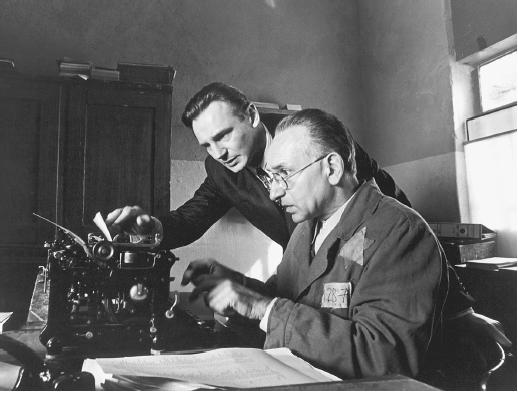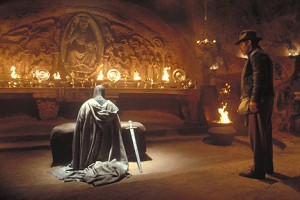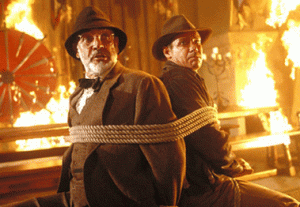From the Chicago Reader (December 17, 1993), also reprinted in my collection Movies as Politics. — J.R.

SCHINDLER’S LIST
*** (A must-see)
Directed by Steven Spielberg
Written by Steven Zaillian
With Liam Neeson, Ben Kingsley, Ralph Fiennes, Caroline Goodall, Jonathan Sagalle, and Embeth Davidtz.

The ideological structures of Spielberg’s films “hail” the spectator into a world of the obvious that affirms the viewer’s presence (even while dissolving it), affirms that what the viewer has always believed or hoped is (obviously) right and accessible, and assures the viewer excitement and comfort in the process. The films offer nothing new beyond their spectacle, nothing the viewer does not already want, does not immediately accept. That is their conservative power, and it has spread throughout the cinema of the 80s. — Robert Phillip Kolker, A Cinema of Loneliness (1988)
Confessions are in order. From Duel to Jurassic Park, there are few Steven Spielberg movies I admire, and none I fully respect — though I respond to a good many of them as obediently as any well-oiled automaton. My first look at Close Encounters of the Third Kind actually brought tears to my eyes. I can’t say that on reflection I felt much pride in this response, though the experience of becoming a boy again in relation to the imagined parental benevolence of the cosmos — which also happens with Ray Bradbury’s best early tales about Mars — may be morally preferable to feeding on the murderous xenophobia of Star Wars, released the same year (1977); at worst one winds up feeling silly rather than dirty afterward. Read more
My column for Caimán Cuadernos de Cine, written on September 23, 2015. — J.R.


Early last September, the first week of my visit to Croatia was occasioned by Tanja Vrvilo’s ninth annual “Movie Mutations” event in Zagreb, this time devoted to Godard. An illuminating highlight was the visit of Fabrice Aragno, Godard’s cinematographer and all-around technical assistant since Notre Musique. And my last three days in Croatia was a social visit to Oja Kodar at the Villa Welles in Primosten. Kodar was Orson Welles’ muse, companion, and major collaborator over the last two decades of his life, and, I’m proud to say, a valued friend in the three decades since then.
Both Kodar and Aragno qualify as the sort of major collaborators who complicate and even confound the sort of solid auteurist profiles that we usually associate with both Welles and Godard — profiles that we also paradoxically associate with their uncanny capacities to engage with the creative imaginations of their viewers. (“I like to think of myself as an airplane, not an airport.” Godard once said to me in a 1980 interview, implying that the proper destination of one of his films is the spectator and where he or she wants to go, not Godard and his own preferred destination — and the same “open” and interactive principle applies to Welles and his own films.) Read more
From the Chicago Reader (June 2, 1989). — J.R.

INDIANA JONES AND THE LAST CRUSADE * (Has redeeming facet)
Directed by Steven Spielberg
Written by Jeffrey Boam, George Lucas, and Menno Meyjes
With Harrison Ford, Sean Connery, River Phoenix, Denholm Elliott, Alison Doody,
Julian Glover, and John Rhys-Davies.

Nazis are fun! Jesus is fun! Arthurian legends are fun! Third world countries are fun! Caves are fun! The Holy Grail is fun! Lots of snakes and rats and skeletons are fun! Chases are fun! Narrow escapes are fun! Explosions are fun! Indiana Jones is fun! Indiana Jones’s father is fun!
Put them all together and you get the third panel in Steven Spielberg and George Lucas’s Indiana Jones triptych — more fun than a barrel of monkeys (or Nazis, chalices, snakes, rats, skeletons — whatever). Though Hitler, Jesus, women, the third world, and, by implication, most of the rest of civilization ultimately take a backseat to the uneasy yet affectionate relationship between a grown boy and his dad — and all those millions of people exterminated by the Nazis (for instance) don’t even warrant so much as a look-in — this is nothing new in the Lucas-Spielberg canon; it isn’t even anything new in movies. Read more






